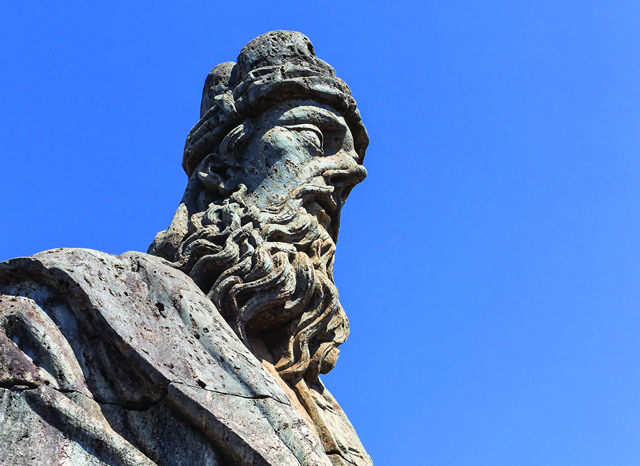
The Message of Nahum – Part 1
Nahum’s prophecy both complements and parallels the book of Jonah. His prophecy corresponds to Jonah, since the latter celebrated God’s mercy, while Nahum proclaimed the worldwide judgment of God against sin.
Jonah’s ministry emphasized the love of God; Nahum’s message proclaims the justice of God. Recognizing that the messages of Jonah and Nahum correspond to one another, it is appropriate to examine them together, as in this series of articles that considers both prophetic ministries.
The prophet Nahum wrote to comfort God’s people and to give assurance of victory over their tormentors. The prevailing theme of Nahum’s prophecy is deliverance for God’s people, as a result of the righteous vengeance of the Lord. American poet and critic James Russell Lowell (1819-91) could have composed his “The Present Crisis” as a summary of the prophecy of Nahum:
Careless seems the great Avenger;
history’s pages but record
One death-grapple in the darkness
‘twixt old systems and the Word;
Truth forever on the scaffold,
wrong forever on the throne,—
Yet that scaffold sways the future,
and, behind the dim unknown,
Standeth God within the shadow,
keeping watch above his own.
Second Kings 6 records a war between Israel and Syria (Aram). The king of Israel was able to elude the Syrian king, because the prophet Elisha warned him as to the method of attack. The king of Syria was enraged that Israel eluded him, and decided to capture Elisha. The king besieged Elisha’s house, yet the prophet did not fear because he knew God had surrounded the Syrians.
With the Syrian host surrounding Elisha, the prophet’s attendant trembled in asking, “‘What shall we do?’” Elisha “answered, ‘Do not fear, for those who are with us are more than those who are with them.’ Then Elisha prayed…And the LORD opened the servant’s eyes and he saw; and behold, the mountain was full of horses and chariots of fire all around Elisha” (vv. 15-17).
Sometimes it appears the darkness is certain to succeed, when the forces of wickedness (cf. Eph 6:12) assemble themselves against the good. When the apostles suffered contempt and threats, the believers sought the Lord in prayer. God answered with boldness and courage granted to His servants (Acts 4:23-31). Will you have the eyes to see “so that you will know what is the hope of His calling” (Eph 4:18)?
GOD IS GREAT, GOD IS GOOD
(Nahum 1:1-8) Nahum’s ministry occurred following the destruction of the Egyptian city of Thebes in 663 BC (3:8). The prophet predicted the fall of the Assyrian capital, Nineveh, which occurred in 612 BC. He likely ministered during the reign of the wicked king Manasseh of Judah (697-42 BC). His message primarily concerned Nineveh, yet he was a Jewish prophet and thus his proclamation was for the Jewish people.
Nahum’s prophecy is designated an “oracle,” which is a message from God that announces judgment. Sometimes the “oracle” is termed a “burden,” because it frequently contained an intense message. The vision that Nahum the Elkoshite received was from the Lord. The book of Nahum is not a narrative like Jonah; rather, it resembles other books that have a prophetic message.
Nahum’s prophecy concerned Nineveh, the principal city of the Assyrian Empire at the time. Nahum likely prophesied around 650 BC. Jonah’s message is dated to 780 BC. More than one hundred years earlier, God sent a reluctant prophet to a “great city” that He declared as wicked (Jon 1:2). God announced, through the prophet Jonah, that he was going to overthrow the city. Nineveh experienced one of the greatest revivals in response to that message, as the king and “the people of Nineveh believed in God” (3:5).
Nahum demonstrates that every generation is responsible for its own moral and spiritual decisions (Ezek 18:20-24). In the time of Jonah, the Ninevites repented in response to the proclamation of God’s Word. However, in the time of Nahum, the people of Nineveh made different choices; for this reason, they were guilty before the Lord. God announced judgment on Nineveh for her cruelty, idolatry, oppression, and wickedness. While exceptional leadership in the past is a blessing, it can never replace one’s faithful responsibility in the present.
The love of God will never allow what His righteousness condemns. God simply cannot excuse or ignore sin. The truth of this assertion should cause rejoicing in divine justice and judgment, because it represents the triumph of holiness.
Verses 2-3 establish the tone for Nahum’s entire message. Nineveh was in trouble with God. Despite the good work of the reluctant prophet Jonah, the city returned to its wickedness. The Ninevites oppressed other countries, performed cruel acts, and worshiped idols. “The Lord is slow to anger” (v. 3a), as evident in His “relenting concerning the calamity which He had declared He would bring upon [Nineveh]” (Jon 3:10). Now the Lord decreed His verdict through the prophet Nahum: this time, He would not relent.
What was the benefit for God’s people to know that Nineveh was to experience judgment? The answer is, it is important to know that the Lord is all-powerful and can be trusted to care for His people, even as He brings justice to those who oppose Him (vv. 3-6). In contrast to those who “endure the burning of His anger” (v. 6b) is God’s promise to “those who take refuge in Him” (v. 7c).
God is great, and He is good. Without His greatness to maintain order, the universe would unravel; yet without His goodness, evil despots would rule the world. God uses His greatness for salvation, and His goodness to draw people to Himself.
 God provides comfort, help, and refuge for those who trust in Him; yet He must outpour judgment upon those who disobey His Word, because He is holy and just. When you obey and trust God, you will enjoy the comfort of His refuge, even in distressing times. Cushing’s hymn “Hiding in Thee” (1876) expresses such truths:
God provides comfort, help, and refuge for those who trust in Him; yet He must outpour judgment upon those who disobey His Word, because He is holy and just. When you obey and trust God, you will enjoy the comfort of His refuge, even in distressing times. Cushing’s hymn “Hiding in Thee” (1876) expresses such truths:
How oft in the conflict, when pressed by the foe,
I have fled to my Refuge and breathed out my woe.
How often when trials like sea billows roll
Have I hidden in Thee, O Thou Rock of my soul.
The goodness of God does not mean He will not bring “His enemies” (and His people’s foes) to justice. Verse 8 returns to the wrathful aspect of God’s character, because His anger toward brutality, pride, and wickedness is a focus of Nahum’s oracle. God is too good not to punish sin. God is so holy and just that He cannot excuse or ignore unrepentant sin. The Lord is angry with those who abuse others, and will bring them to “a complete end.”
GOD IS INVICIBLE, GOD IS SALVATION
(Nahum 1:9-15) To resist God is futile, because He is invincible. Whereas verses 2-8 emphasized the character of God, verses 9-15 focus more directly upon Nineveh. Whatever a person devises “against the LORD” will fail (cf. Ps 2:1-5). The Assyrians besieged Jerusalem once (2 Kgs 18), but would not do so again (Nah 1:9). To oppose God’s people is truly opposition to the Lord Himself, and He will not permit those plans to succeed.
Three images depict Nineveh’s complete destruction: “thorns,” drunkenness, and “stubble” (v. 10). Nineveh was in trouble because the Lord will overcome any plots against Him or His people (v. 11). Even though the Assyrians were “at full strength and likewise many, even so, they [would] be cut off and pass away” (v. 12). Nineveh’s defeat would be a blessing to God’s people, because they would be freed from Assyrian oppression (v. 13). Nahum emphasized that his message was not a personal verdict for the Lord had spoken (v. 12a), thereby guaranteeing the fulfillment.
Nineveh boasted that its gods were invincible, and even claimed to be more powerful than God Himself (Isa 36:18-20; 37:10-13). Yet the Lord would cast those false deities upon the trash heap and empty their temples. When the Assyrians conquered other nations, they would take their idols to demonstrate the superiority of the Assyrian gods in contrast to those of the nation being defeated. God would prepare the grave—in great humiliation—for Nineveh and its idols (Nah 1:14).
In response to Nineveh’s fall, the people of God would “celebrate” (v. 15). The celebration was not that of revenge; rather, it was rejoicing because justice was accomplished and their oppression had come to an end. The omnipotent God is able to deliver His people and to defeat their oppressors, regardless of how powerful they may appear. Beware of anyone who would encourage your trust in someone (or something) other than the true God of the Holy Bible. The Lord is good and the Refuge for His people.
Midnight Call - 04/2021

